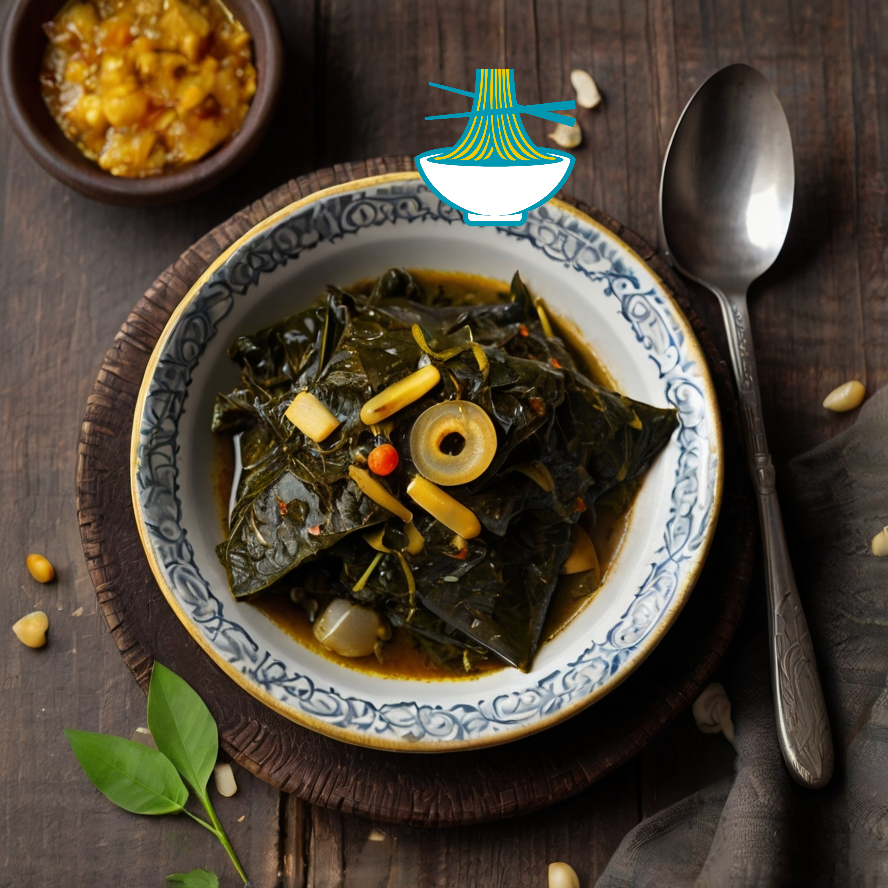Discover how to make a traditional Cassava Leaves stew, a beloved national dish renowned for its rich flavors. This recipe features tender cassava leaves stewed in flavorful palm oil, combined with onions and your choice of meat or fish. Perfect for a hearty meal, this dish offers a unique taste of cultural heritage and is sure to become a family favorite.
Ingredients:
- 2 cups fresh cassava leaves, finely chopped
- 1/2 cup palm oil
- 1 large onion, chopped
- 2 cloves garlic, minced
- 1 teaspoon ground ginger
- 1 teaspoon ground coriander
- 1/2 teaspoon ground cumin
- 1/2 teaspoon paprika
- 1 teaspoon salt (or to taste)
- 1/2 teaspoon black pepper (or to taste)
- 1 pound meat (beef, goat, or chicken), cut into chunks
- 1-2 cups fish (optional), cut into pieces
- 4 cups water or broth
- 1 tablespoon bouillon powder (optional)
- 1-2 tomatoes, diced (optional)
Instructions:
Prepare the Cassava Leaves: Wash and chop the cassava leaves finely. If using frozen cassava leaves, thaw them before use.
Cook the Meat: In a large pot, heat the palm oil over medium heat. Add the chopped onions and cook until they are soft and translucent. Add the garlic, ginger, coriander, cumin, paprika, salt, and pepper. Stir and cook for another 2 minutes until fragrant.
Add the Meat: Add the meat chunks to the pot and cook until browned on all sides. If using fish, add it later to avoid overcooking.
Simmer: Pour in the water or broth, and add the bouillon powder if using. Bring to a boil, then reduce the heat and let it simmer for about 30-45 minutes, or until the meat is tender.
Add Cassava Leaves: Add the chopped cassava leaves to the pot. If desired, add diced tomatoes. Stir well and let it cook for an additional 15-20 minutes until the leaves are tender and the flavors are well combined.
Adjust Seasoning: Taste the stew and adjust seasoning if necessary. If using fish, add it in the last 10 minutes of cooking to avoid it becoming too dry.
Serve: Serve the Cassava Leaves stew hot with rice or a side of your choice. Enjoy this rich and flavorful dish that embodies a taste of traditional cuisine.
Nutritional values
2 cups fresh cassava leaves, finely chopped
- 30 calories
- 2g protein
- 5g carbohydrates
- 0.5g fat
Benefits: Rich in vitamins A and C, calcium, and iron. Provides dietary fiber and antioxidants.
1/2 cup palm oil
- 450 calories
- 0g protein
- 0g carbohydrates
- 50g fat
Benefits: Contains vitamins A and E. Adds richness and flavor but should be used in moderation due to high fat content.
1 large onion, chopped
- 60 calories
- 1g protein
- 14g carbohydrates
- 0g fat
Benefits: Provides flavor and is a source of antioxidants and vitamins such as vitamin C.
2 cloves garlic, minced
- 9 calories
- 0.4g protein
- 2g carbohydrates
- 0g fat
Benefits: Contains allicin, which may have anti-inflammatory and immune-boosting properties.
1 teaspoon ground ginger
- 6 calories
- 0.1g protein
- 1g carbohydrates
- 0g fat
Benefits: Known for its anti-inflammatory properties and can aid digestion.
1 teaspoon ground coriander
- 6 calories
- 0.3g protein
- 1g carbohydrates
- 0.3g fat
Benefits: Contains antioxidants and may aid in digestion and blood sugar regulation.
1/2 teaspoon ground cumin
- 8 calories
- 0.4g protein
- 1g carbohydrates
- 0.5g fat
Benefits: Provides a distinctive flavor and contains antioxidants that may support digestion.
1/2 teaspoon paprika
- 6 calories
- 0.2g protein
- 1g carbohydrates
- 0.3g fat
Benefits: Adds flavor and color, and is rich in antioxidants such as vitamin A.
1 teaspoon salt (or to taste)
- 0 calories
- 0g protein
- 0g carbohydrates
- 0g fat
Benefits: Enhances flavor but should be used in moderation to manage sodium intake.
1/2 teaspoon black pepper (or to taste)
- 6 calories
- 0.2g protein
- 1g carbohydrates
- 0.3g fat
Benefits: Adds a spicy kick and contains piperine, which may aid in digestion.
1 pound meat (beef, goat, or chicken), cut into chunks
Beef:
- Approximately:
- 1020 calories
- 90g protein
- 0g carbohydrates
- 72g fat
Benefits: High in protein and iron, essential for muscle repair and overall health.
Goat:
- Approximately:
- 800 calories
- 80g protein
- 0g carbohydrates
- 48g fat
Benefits: Leaner than beef and provides essential nutrients like protein and iron.
Chicken:
- Approximately:
- 750 calories
- 90g protein
- 0g carbohydrates
- 36g fat
Benefits: Provides high-quality protein and vitamins such as B6 and niacin.
1-2 cups fish (optional), cut into pieces
- Varies by type, but generally:
- 200 calories (per 100g)
- 20g protein
- 0g carbohydrates
- 10g fat
Benefits: High in protein and omega-3 fatty acids, beneficial for heart health.
4 cups water or broth
- 0 calories
- 0g protein
- 0g carbohydrates
- 0g fat
Benefits: Essential for cooking and hydration. Broth adds flavor and some nutrients.
1 tablespoon bouillon powder (optional)
- 30 calories
- 1g protein
- 5g carbohydrates
- 1g fat
Benefits: Enhances flavor but use in moderation due to high sodium content.
1-2 tomatoes, diced (optional)
- 36 calories
- 1g protein
- 8g carbohydrates
- 0g fat
Benefits: Rich in vitamins A and C, and lycopene, which is an antioxidant.


Comments